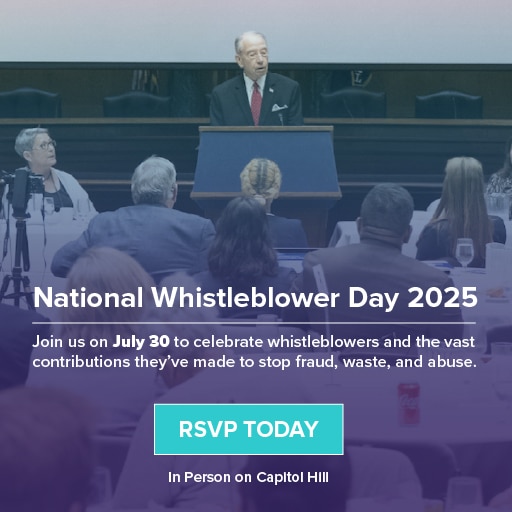Theo Nyreröd doesn’t buy into the stereotype that the only good whistleblower is a martyred whistleblower.
The time has come, he says, to dispense with the age-old notion of a morally perfect person who is willing to sacrifice everything – their job, their financial future and their family’s well-being – in order to expose a hidden crime. A penniless whistleblower is not a success story.
“There is a perception that people should have to suffer in order to be a whistleblower,” says Nyreröd, a doctoral researcher in law at Brunel University in London. “The truth is that most people wouldn’t risk their well-paying job at the bank or at the company where they work. They don’t want to throw their career away.”
Acting selflessly for the benefit of society is among the most admirable things a person can do. But if we expect a person to lose everything in the process, says Nyreröd, this is a price that is too high for almost anyone to pay.
Nyreröd’s solution? He is one of the growing number of researchers studying how monetary rewards can incentive vulnerable witnesses to come forward, and compensate them for career damage that in many industries is virtually automatic.
“Paying people for information is a no-brainer. Otherwise, witnesses who are at risk of retaliation are forced to remain silent,” said Nyreröd, who has published many journal articles and policy papers on whistleblower protection and reward programs. “Many people need something more than just the personal satisfaction of doing the right thing. They need an incentive.”
Regulators and law enforcement also need all the help they can get, Nyreröd says, particularly when it comes to detecting and prosecuting white-collar crime. Any reasonable tool to fight corruption should be considered. “We have to shake things up,” he said.
Overcoming societal opposition to paying whistleblowers – “We don’t pay snitches” – is difficult. In a paper he co-authored, Nyreröd explains that Europe’s opposition to rewards is linked to “path dependence” – what he calls “the persistent effects of its history on legal and social culture and traditions.” He cites Nazi Germany and Soviet Russia dictatorships that “relied heavily on citizens reporting on one another.” This may explain why most Europeans “view mechanisms that incentivize reporting with suspicion.”
‘Eyes and Ears’
The idea of whistleblower rewards is as old as democracy itself. The concept goes back at least to ancient Rome, which had a type of “private law enforcement” that paid witnesses a percentage of recovered funds. “This system is very old,” Nyreröd said.
It’s also been dated to 7th century England. Later, following The Plague in the 14th century, British citizens were rewarded for reporting violations of a regulation that banned people from being paid more than what they earned before the outbreak. “Eventually rewards were used for many things in England. They applied to a broad swath of the population,” he said.
Reporting all manner of crimes in England could fetch a reward, including customs violations, illegal alcohol sales and breaking such laws as the White Herring Fisheries Act of 1771. “Citizens were the eyes and ears,” said Nyreröd. “It was almost like a profession, especially in communities that didn’t have a police department.”
The system was abolished in 1951 by the so-called Common Informers Act. But the UK has since brought back whistleblower rewards. The Revenue and Customs agency pays people based on the value of the evidence they provide: the amount of taxes recovered, the value of loss prevented, and time saved to investigate cases.
Today, at least 16 countries in Europe, the Americas, Africa and Asia have some sort of reward program in place. The US has by far the most reward laws and programs, including the Foreign Corrupt Practice Act, False Claims Act, Dodd-Frank Act, and the Commodity Exchange Act.
The Economic Value of Information
In researching his Ph.D. thesis on the design and performance of whistleblower laws, Nyreröd has explored many arguments in favor of rewards.
On top of the obvious benefit of compensating people who are punished for no fault of their own, rewards have a strong symbolic value. Nyreröd makes the philosophical point that rewards “can turn capitalism on its head, by turning the toxic part of capitalism against itself.”
Related to this, Nyreröd said crooked politicians and company executives tend to project their own financial motivations onto the people around them. Rewards thus can serve as a deterrent. “They think a whistleblower also might be after an economic benefit. If a whistleblower has a financial motivation, this can represent a threat in the mind of the crook,” he said.
This economic benefit, he said, should be based on the scale of the crime itself. Typical whistleblower protection laws treat everyone the same: a person doesn’t get ”more” protection if he or she reveals a huge corruption case. Rewards can add proportionality: the larger the fines that violators have to pay, the larger the reward the whistleblower receives. “Information has an economic value,” says Nyreröd. “The reward should be based on the seriousness of the crime.”
Nyreröd points out a key discrepancy between white-collar corruption, which often gets little attention, and violent crime, which is high-profile and shocking. For centuries, police have dangled rewards as an incentive for citizens to turn in murderers, robbers and drug dealers. There is no controversy here. “The damage is obvious. We can see it,” he says.
On the other hand, because financial crimes are more subtle, the public typically doesn’t respond as viscerally. “These are ‘boring’ crimes that we don’t really get engaged with. The consequences are not as obvious.” Therefore, Nyreröd said, the idea of paying rewards is less convincing. “The reality is that the damage caused by white-collar crimes can be much more serious than we think.” Paying rewards to corruption whistleblowers, he said, can help expose the real harm caused by white-collar criminals.




